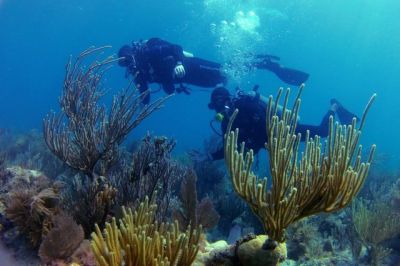
The evidence suggests that Florida’s coral reefs are in serious trouble. Coral coverage in the Keys has diminished from 55 percent in 1975 to less than 5 percent today, despite the creation of the Florida Keys National Marine Sanctuary in 1990 and extensive regulations enacted to protect corals. Since 1995 reef-based recreation has dropped about 20 percent.
Marine conservation is typically funded by government tax dollars and charitable giving, but these funding sources are unpredictable and uncertain. For example, consider the one-time multi-million dollar coral restoration grant included in the American Recovery and Reinvestment Act (ARRA). These funds advanced active restoration technology, which entails raising corals in nurseries and then transplanting them on damaged reefs in the Keys, but the funding was cut by approximately 70 percent when ARRA grants came to an end in 2012. Ongoing funding is uncertain.
Markets offer a more stable funding source for reef restoration. Through leases or zoning, state and federal agencies could create limited access areas where non-profit and for-profit organizations invest in active reef restoration projects. Those organizations could recoup their restoration investments with user fees willingly paid by reef recreationists and conservationists to enjoy healthier, restored reefs.
With a clear incentive to steward the reefs, these groups could also monitor for and prevent actions that destroy reef resources, such as careless anchoring. The idea is to avoid the tragedy of the commons by creating an ownership interest in the reefs and harnessing financial incentives for reef restoration.
Florida has a major constituency of recreationists and dive shop operators who are used to accessing reefs at little to no cost. Even if market-based restoration were implemented, free access could still be available in non-restored areas. In essence, reef recreationists, visitors, and their guides would have a choice of whether to visit a restored reef for an additional fee or a continually degraded, but open-access commons for free. Those willing to pay a restoration premium would not only observe, but also contribute to Florida’s reef recovery. The idea of charging user fees for outdoor recreation is a proven concept; it’s neither absurd nor fringe, as quotes in the January article suggested. In fact, user fees are pervasive throughout the National Park system including at Dry Tortugas National Park located approximately 70 miles from Key West. User fees help to fund facility improvements, natural and cultural resource preservation, and interpretation of park resources. Fees allow visitors to contribute to the stewardship of the natural resources that they so dearly value.
Recognizing that current approaches are not achieving the desired level of reef conservation, NOAA is currently considering changes to the Florida Keys National Marine Sanctuary rules and boundaries. User fees combined with private investment in and management of the resource could slow and eventually reverse further degradation of Florida’s coral reefs. It is an idea worth serious consideration and, at the very least, a fair presentation in the media.
In light of the challenges reefs face, it seems unwise to prematurely dismiss the suite of market-based approaches that have been highly effective on land. We should forge ahead on all fronts: protected areas, regulated activities, active restoration efforts and, yes, even fee-based approaches, if they can halt the decline of reefs and help restore them to a semblance of their former glory.
Read the full article written by Howell and Watson here. Cross-posted from the Georgia Aquarium Blog.




